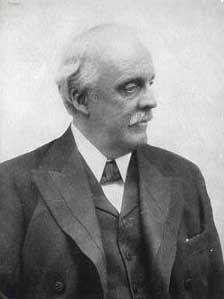The Balfour Declaration & the Treaty of Versailles
Compiled by Henrik Palmgren | Red-Ice.net

Arthur James Balfour |
Foreign Office
November 2nd, 1917
Dear Lord Rothschild,
I have much pleasure in conveying to you, on behalf of His Majesty's Government, the following declaration of sympathy with Jewish Zionist aspirations which has been submitted to, and approved by, the Cabinet.
"His Majesty's Government view with favour the establishment in Palestine of a national home for the Jewish people, and will use their best endeavours to facilitate the achievement of this object, it being clearly understood that nothing shall be done which may prejudice the civil and religious rights of existing non-Jewish communities in Palestine, or the rights and political status enjoyed by Jews in any other country."
I should be grateful if you would bring this declaration to the knowledge of the Zionist Federation.
Yours sincerely,
Arthur James Balfour
From: http://www.lib.byu.edu/~rdh/wwi/1917/balfour.html
Statement issued by the British government in 1917, which is often seen upon as the initiation of the process that led to the establishment of the State of Israel. Issuing of the statement is believed to have been motivated just as much by British interests, as by the sympathy for the Zionist cause. At the eve of the World War I Britain needed the support from the World Jewry, which had been neutral, and which represented a large part of the population of Germany and Austria-Hungary. The declaration was drafted with the help of US President, Woodrow Wilson, who was a strong supporter of Zionism.
Secondly, Britain saw the need to protect the sea route to India, which passed through the Suez Canal, upon which much of Britain's economy relied. In accordance with the spirit of the time which emphasized the "self-determination of small nations", supporting Zionism would be the easiest way of securing lasting British influence of the region east of the Canal, especially because the Levant had been Ottoman until 1917.
From: http://i-cias.com/e.o/balfour_d.htm
More: Zionism, Israel & Shabbetai Tzvi
Treaty of Versailles

Woodrow Wilson and the American peace commissioners
The Treaty of Versailles of 1919 is the peace treaty created as a result of six months of negotiations at the Paris Peace Conference of 1919, which put an official end to World War I between the Allies and Central Powers. The treaty was a follow-up to an armistice signed months before in the forest of Compiègne, which put an end to the fighting. The treaty required that Germany claim full responsibility for causing the war, and pay large amounts of compensation (war reparations) to the allies. Germany also lost territory to many surrounding countries, had its military forces severely limited and was stripped of its overseas and African colonies. Representatives of the new German government (Weimar Republic) were forced by the victors to sign the treaty, otherwise fighting was threatened to begin anew. Thus Germany's foreign minister, Hermann Müller, undersigned it on June 28, 1919. The treaty was ratified by the League of Nations on January 10, 1920. In Germany the treaty caused a shock—often referred to as a trauma or anti-Versailles-complex— which eventually contributed to the collapse of the Weimar Republic in 1933, and thus Adolf Hitler's rise to power.
More: Treaty of Versailles (wikipedia)
More: The Amazing Warnings Of Benjamin Freedman
“You must understand that this war [WWII] is not against Hitler or National Socialism, but against the strength of the German people, which is to be smashed once and for all, regardless whether it is in the hands of Hitler or a Jesuit priest.”
— Winston Churchill
|
|
|


